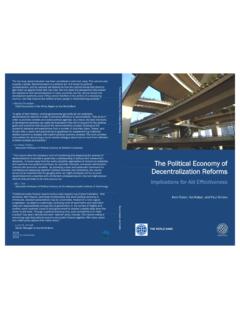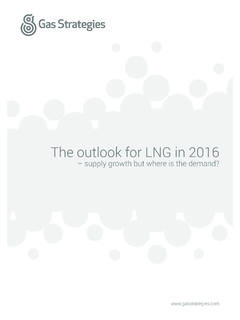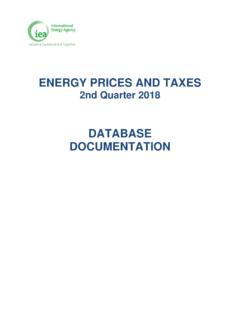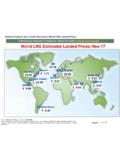Transcription of Residential Market for LPG: A Review of Experience of 20 ...
1 Residential Market for LPG: A Review of Experience of 20 developing countries Prepared by William G. Matthews and Dr. Hilmar R. Zeissig for the world Bank December 2011 H O U S T O N I N T E R N AT I O N A L B U S I N E S S C O R P. Energy and Environmental Policy Consultants 151 Moss Point, Friendswood, Texas 77546, Tel.: (281) 996-9995 Fax: (281) 996-9994 E-mail: The views expressed are those of the consultants and should not be attributed to the world Bank or its Executive Directors. 2 Table of Contents Acknowledgments ..3 Abbreviations ..4 Executive Summary ..6 1. Introduction .. 11 2. Aggregate and Comparative Data of the Study countries .. 19 3. Ghana .. 46 4. Kenya .. 59 5. Senegal .. 66 6. South Africa .. 72 7. Fiji .. 77 8. Thailand .. 80 9. Vietnam .. 86 10. Albania .. 91 11. Moldova .. 95 12. Turkey .. 98 13. Brazil .. 114 14. Dominican Republic .. 123 15. Guatemala .. 129 16. Mexico .. 136 17. Peru.
2 146 18. Canada/Ontario .. 157 19. Texas, United States .. 162 20. Jordan .. 168 21. Morocco .. 173 22. Afghanistan .. 178 23. Pakistan .. 181 24. Sri Lanka .. 189 3 Acknowledgments We are grateful to the Norwegian Agency for Development Cooperation for funding this study through its Petroleum Governance Initiative under the Oil for Development program. We also wish to express our appreciation to Gazmend Daci in Albania, Ana Taula Tu ionuku and Demetrios Papathanasiou in Fiji, Waqar Haider and Geraldine Wilson in Ghana, Kyran O Sullivan in Kenya, Yesim Akcollu in Turkey, and Anh Nguyet Pham for Vietnam, all world Bank staff in country offices; Victor Hugo Ventura of the UN Economic Commission for Latin America and the Caribbean in Mexico City; and Peter Nduru, Director-Petroleum, Energy Regulatory Commission in Kenya for providing information or points of contact for information related to LPG in their respective countries .
3 We would particularly like to thank the following organizations in Ghana and Turkey for their kind assistance to William Matthews during his field trips to these countries : Ghana: Association of Oil Marketing Companies (AOMC) of Ghana FUELTRADE Ltd. (Bulk Distribution Company) Ghana National Fire Service (GNFS) Ghana Oil Company Ltd (GOIL Ministry of Energy, Ghana, Petroleum Downstream Department National Petroleum Authority (NPA) Tema Oil Refinery (TOR) Ltd. Total Petroleum Ghana Limited Turkey AYGAZ Energy Market Regulatory Authority (EPDK) IPRAGAZ Milangaz T pras (Turkish Petroleum Refineries Corporation) Turkish LPG Association Lastly, we would like to acknowledge the invaluable guidance, advice and assistance of Masami Kojima of the Oil, Gas, and Mining Unit of the world Bank throughout the entire study execution and report writing and editing process. 4 Abbreviations ABNT Associa o Brasileira de Normas (Brazilian Association for Technical Norms) AFRED Alternative Fuels Research and Education Division (Texas, United States) ANSA Afghanistan National Standardization Authority ANSI American National Standards Institute ANP Ag ncia Nacional do Petr leo, G s Natural e Biocombust veis (National Agency for Petroleum, Natural Gas, and Biofuels, Brazil) ANRE National Energy Regulatory Agency (Moldova) API American Petroleum Institute ARA Antwerp, Rotterdam and Amsterdam ASME American Society of Mechanical Engineers ASN Association S n galaise de Normalisation (Senegalese Association for Standardization) ASTM American Society for Testing and Materials bpd barrels per day oC degrees Celsius CFR Code of Federal Regulations (United States) CIF cost, insurance, and freight CNG compressed natural gas CNH Comit Nationale des Hydrocarbures (National Committee for Hydrocarbons, S n gal))
4 CSA Canadian Standards Association DOT Department of Transport (United States) DWT dead weight tonnes EPDK Enerji Piyasas D zenleme Kurumu (Energy Market Regulatory Authority, Turkey) EPPO Energy Policy and Planning Office (Thailand) ERC Energy Regulatory Commission (Kenya) GSB Ghana Standards Board FLGE Fuel and Liquid Gas Enterprise (Afghanistan) FOB free on board HHI Herfindahl-Hirschmann index HSE health, safety, and environmental INDECOPI Instituto Nacional de Defensa de la Competencia y de la Protecci n de la Propiedad Intelectual (National Institute for the Defense of Competition and Intellectual Property, Peru) ISO International Organization for Standardization JPRC Jordan Petroleum Refining Company KEBS Kenya Bureau of Standards 5 lb pounds ( kilograms) kg kilograms ( pounds) LNG liquefied natural gas LPG, LP Gas liquefied petroleum gas LPGSASA Liquefied Petroleum Gas Safety Association of Southern Africa MOCI Ministry of Commerce and Industry (Afghanistan) MOLDST Department of Standardization and Metrology (Moldova) NACE National Association of Corrosion Engineers NFPA National Fire Protection Association (United States) NOM Norma Oficial Mexicana (official Mexican norm) NPA National Petroleum Authority (Ghana) OGRA Oil and Gas Regulatory Authority (Pakistan) per annum Pemex Petr leos Mexicanos PGPB Pemex Gas y Petroqu mica B sica (Mexico) PPP purchasing power parity PUCSL Public Utilities Commission of Sri Lanka RRC (Texas) Railroad Commission SABS South African Bureau of Standards SAR Soci t Africaine de Raffinage (African Refining Company, S n gal) STAMEQ Directorate for Standards and Quality (Vietnam)
5 TIS Thai Industrial Standards TLPGA Turkish LPG Association TNRC Texas National Resource Code TSE T rk Standardlari Enstit s (Turkish Standards Institute) TSSA Technical Standards and Safety Authority (Ontario) UNDP United Nations Development Programme VAT value-added tax VPM ventas de primera mano (first-hand sales) WLPGA world LPG Association 6 Executive Summary This study was undertaken as part of a larger study examining how liquefied petroleum gas (LPG) can contribute to reducing household energy poverty in developing countries . Energy poverty remains prevalent in the developing world , where an estimated billion people lack access to electricity and three billion continue to rely on traditional solid fuels for cooking and heating. The study takes 20 developing countries from around the world and assesses the legal framework, industry and Market structures and practices, supply arrangements and infrastructure, and pricing policies.
6 The information from developing countries is supplemented by case studies of Ontario, Canada and Texas, United States to illustrate how markets with a strong legal framework and Market governance operate. Consumption and price levels The developing countries examined varied in kilograms (kg) of LPG consumed by households both per person and per dollar of gross domestic product (GDP) valued at purchasing power parity (PPP). Figure shows the statistics for 2008, the last year for which the data are available for most countries . Household use of LPG tends to rise with income, except where natural gas is increasingly supplied to (urban) Residential consumers, as in Moldova, Pakistan and Turkey, or where electricity is widely used for cooking and heating, as in South Africa. Figure : Household consumption of LPG in 2008 Lankakg of LPG per person024681012kg per US$million GDP at PPPper capitaPer $million GDP at PPP Sources: See country chapters in the report.
7 Note: Household consumption of LPG in Afghanistan in 2008 was not available. The retail prices charged in December 2010 varied by a factor of eight, ranging from US$ per kg in Morocco to $ per kg in Turkey (Figure ). Two markets from North America, Ontario and Texas, are included for comparison. The international bulk supply prices in November and December of 2010 were about US$ in the 7 Gulf Coast (benchmark for North America and Latin America), US$ in Europe (benchmark for Eastern Europe, Turkey, and some parts of Africa), and US$ in the Arab Gulf (benchmark for east Africa and Asia). To these bulk supply prices must be added transport and distribution costs, company profits, and taxes. It is clear that the pricing policies in Ghana, Thailand, Mexico, Jordan, and Morocco involved some elements of price subsidy. The top five countries as measured by kg of LPG consumed per person in Figure Mexico, the Dominican Republic, Morocco, Jordan, and Thailand were all low-price markets in December 2010.
8 Figure : Retail prices of LPG in December 2010 AfricaFijiThailandVietnamAlbaniaMoldovaT urkeyBrazilDominicanRepublicGuatemalaMex icoPeruCanada/OntarioUSA/TexasJordanMoro ccoAfghanistanPakistanSri LankaUS$ per kg Sources: See country chapters in the report. Note: All prices are for LPG sold in cylinders except Moldova, where the price is the pump price for automotive LPG sold at filling stations. Regulatory framework for LPG The downstream petroleum laws and general regulations in many of the developing countries reviewed are incomplete and often antiquated. Only about half of the countries have promulgated special regulations for LPG , but most have issued at least some national standards and/or formally adopted international or regional standards for quality control and protection of occupational health, safety and the environment (HSE). LPG has well defined specifications in the international markets. The appliances for use in households as well as the facilities and equipment for transport, storage and distribution are relatively simple and similar around the world .
9 As such, it is not necessary for developing countries to re-create their own HSE standards and technical specifications for LPG and the chain of supply. The standardization laws in many jurisdictions specifically allow the formal adoption of foreign norms as an alternative to the writing of national standards. Nicaragua, Madagascar, Tanzania and Uganda have recently promulgated modern laws for the downstream petroleum sector that mandate the formal adoption of international 8 standards as the preferred method to regulate HSE. Although not mandated by law to do so, Albania, Ghana, Guatemala, Moldova, Morocco, Pakistan, Sri Lanka and Turkey as well as Ontario/Canada and the state of Texas have formally adopted the principal standards for the LPG chain of supply from Europe or the United States, from the International Organization for Standardization (ISO) or from regional standardization bodies.
10 Mexico and Peru, on the other hand, issue detailed standards or technical regulations, most of which are based on or referring to international standards without formally adopting them. Most other countries have adopted at least some foreign standards or include references in their national standards. In countries where the legislation and/or standardization are incomplete, as in Afghanistan, the Dominican Republic, Fiji, Senegal, Thailand and Vietnam, international standards are often applied by the regulators and the industry as a matter of fact. Whether those rules are applied and enforced in practice depends more on the institutional structures and capacities of the government than on the completeness and sophistication of the regulatory framework. The subsidiaries of major international oil companies and well organized local operators, privately or state-owned, tend to apply the basic standards regardless of the mandates and efficiency of the applicable legislation.



















